It’s hard to believe it’s already the last week of February! But it is, which means that this is the final installment of Fred MacMurray Friday. I’ve had such a good time focusing on MacMurray and his films this month. I hope you’ve enjoyed it too, and that you’ve been inspired to watch some of his many wonderful movies.
Today we’ll skip ahead about a decade from last week’s dark comedy, Murder, He Says and shift gears entirely. This film is no comedy, though it certainly has the “dark” part covered.
There’s Always Tomorrow (1956)
It’s not often that classic movie melodramas focus on the emotional crises of men. Normally it’s a neglected wife and mother yearning for passion, excitement and appreciation, not a neglected husband and father. There’s a reason they labeled them “women’s pictures,” after all. But Douglas Sirk’s There’s Always Tomorrow gives us a sympathetic portrait of a man in crisis, showing us that the rigid post-war gender roles and societal expectations so suffocating for women could be just as stultifying and difficult for men.
Fred MacMurray is Clifford Boles, a California toy manufacturer and family man trapped in a life of routine and responsibility. He’s taken for granted by his family, who brush him aside in their rush of daily activities. Cliff’s wife, Marion, played by Joan Bennett, focuses all her attention on their three children – a college-age son, a teenage daughter, and another, younger daughter. She’s so busy taking care of them that Cliff can’t even take her out to dinner and a show on her birthday. She rebuffs all Cliff’s attempts to spend time with her or rekindle their marriage. She loves him, but she’s complacent, and completely devoted to her children to the exclusion of her husband.
When Norma Vale, a former colleague who now works in New York as a fashion designer, unexpectedly comes back into his life, Cliff isn’t looking for escape or romance. But of course that’s the turn things take. Norma (Barbara Stanwyck, still gorgeous and with an enviably sexy figure at age 49) was in love with Cliff twenty years before, and though she doesn’t reconnect with him in order to have an affair, she still carries a torch.
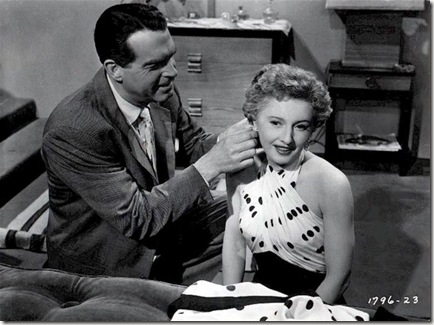
She’s having a crisis of her own, questioning her life as a career woman. She has a failed marriage behind her and, as Marion points out to Cliff after Norma has dinner with the family, has missed out on the things all women want – a home and children. Oh yeah, and a husband, too. (Did I mention that Marion takes Cliff for granted? He’s always an afterthought.)
One of the interesting things about this movie is that it doesn’t turn into a typical triangle, with the wife discovering the affair and fighting to keep her husband. In fact, Marion seems unaware of Cliff’s growing feelings for Norma. She doesn’t even blink when he tells her that he and Norma ran into each other at a Palm Valley resort during a business trip, and spent the entire weekend together. She seems to trust him implicitly, or else simply not think of him as someone who would ever have an affair or attract a woman in that way.
Instead it’s the Boles’ children who provide the roadblock to Cliff and Norma’s romance. Cliff’s son, Vinnie, sees Cliff and Norma together in Palm Valley, and though their relationship was nothing but friendship at that point, he assumes the worst. He and his teenage sister, Ellen, confront Norma, who soon realizes there’s no way the story can end other than her going back to her life in New York and Cliff going back to his family.
“Love is a very reckless thing,” she tells Vinnie and Ellen. “Maybe it isn’t even a good thing. When you’re young and in love, nothing matters except your own satisfaction. The tragic thing about growing older is that you can’t be quite as reckless anymore.”
Both MacMurray and Stanwyck give sensitive, honest performances as two middle-aged people who briefly find passion and love before being thrust back into the gilded cages of their lives sadder, but supposedly wiser. This was the final of four movies in which they co-starred, and they’re so comfortable together that you feel right from the start that Cliff and Norma are kindred spirits, both searching for something missing in their lives.
The movie is beautifully photographed and full of classic Sirkian symbolism. Cliff secretly telephones Norma at night, from the home that has become a prison to him.
Mirrors and reflections abound, giving the audience a glimpse at the duality of characters, and the facades they put on for the world.
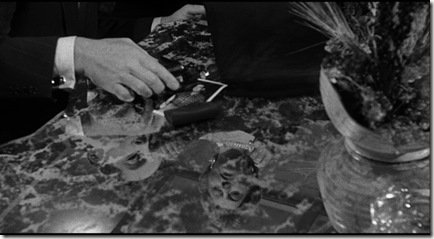
A robot in Cliff’s toy design workshop is in the foreground when Norma tells him their relationship has to end, depriving him of his brief escape from the soulless existence he endures at work and at home.
It’s not subtle, but it’s effective. This article from Cineaste.com delves into the deeper meanings behind what we see in the movie. There’s Always Tomorrow doesn’t seem to be as well known as other Sirk masterpieces, like All that Heaven Allows, Magnificent Obsession, Written on the Wind and Imitation of Life, but it’s just as powerful an example of the director’s visual and emotional style.
I was heartbroken for Cliff and Norma by the end of the movie, especially for Cliff, whose growing anguish, brief moment of respite and hope, and return to the depressing bosom of his family was beautifully portrayed by Fred MacMurray. Cliff’s return to his family is ostensibly the movie’s happy ending, but it left me feeling rather hopeless and bereft for this sad man.
I’m sure that was Sirk’s intention. After all, the movie starts out with the words “Once upon a time in sunny California…” projected over a scene of gloom and rain outside Cliff’s toy factory. Irony is the name of the game here.
I think the thing I’ve come to love and appreciate most about Fred MacMurray’s performances, whether in romantic comedy, silly slapstick, or tragic melodrama, is how perfectly he depicts the average, everyday man. He’s the boy next door in his 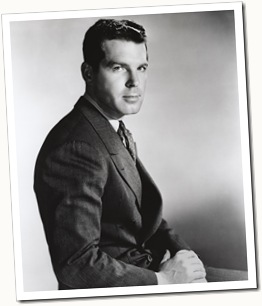 younger days and the suburban husband and father in middle age. He’s the insurance salesman who meets a dangerous woman and gets in over his head, the sleazy executive having affairs in his underling’s apartment, the decent man trapped in a suburban prison.
younger days and the suburban husband and father in middle age. He’s the insurance salesman who meets a dangerous woman and gets in over his head, the sleazy executive having affairs in his underling’s apartment, the decent man trapped in a suburban prison.
He’s just a guy. Handsome, but not ridiculously so. Someone you might run into at the office or dropping the kids off at school. An everyman. He played those kinds of roles over and over again in different incarnations, from the comic to the tragic. He brought his “regular Joes” realism, depth, darkness, light, humor, and pathos.
MacMurray was a very versatile, talented actor, something I’ve come to realize more fully over this month of focusing on his movies. Although Fred MacMurray Fridays are done for now, I’m sure he’ll keep popping up around here as I continue to discover and enjoy his work.

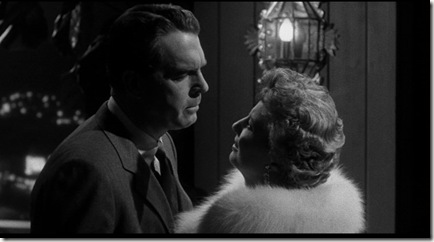
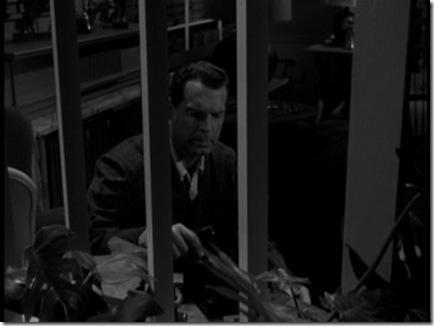
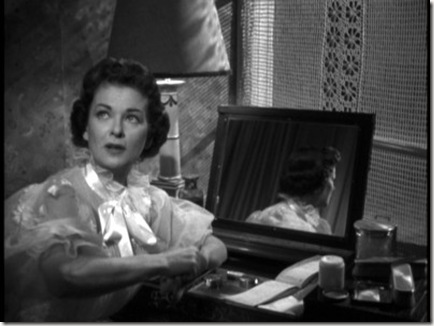
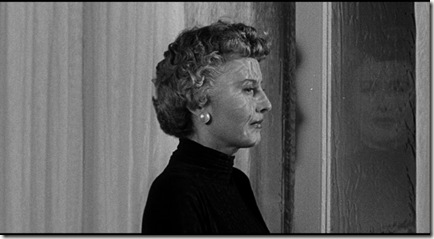
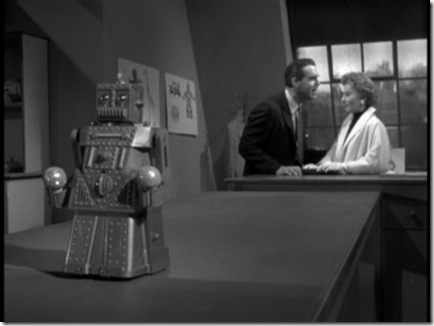
I love this movie. In fact, it’s the only Sirk movie I really like. His other, more famous films are too soapy for me.
It’s definitely one of Sirk’s best. Stanwyck and MacMurray are both excellent.